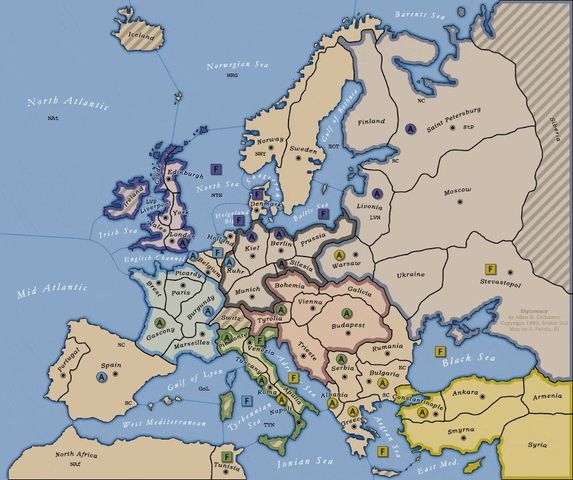Builds and Removals for the 1905 year are complete.
Germany is down one army (or is it the Kaiser’s Personal Guards) in Silesia.
Italy belatedly realizes the importance of maritime power and builds a fleet in Venice.
England, not having any maritime powers to fear, builds another Army to send to the continent.
Players, the deadline for the Spring 1906 Orders is this Thursday, midnight EST.
MP

Results for Fall, 1905 (Adjustment)
General Notices:
Order resolution completed on 24-Nov-2014 at 07:36:53 EST
Order Results:
England: Builds A lon
Germany: Removes A pru
Italy: Builds F ven
Russia no longer controls any supply centers, and has been eliminated.

Fall of Empires...
ReplyDeleteA comment by General Sir Erasmus Blatt (rtd), correspondent for the Daily Dissembler, and the Rioters News agency.
The Twentieth century has scarce outlasted 5 years and two great Empires have now fallen, and taken their ruling Houses with them. The House of Hapsburg is no more, and now the House of Romanoff also eneters the portals of oblivion. Belike, for all the ingenious tenacity, the Hohenzollerns will complete the early trio of failed Rule.
But look at what has been left in their wake? Can poor Europe, benighted by the darkness of war, recover from the chaos that has descended in the wake of these failures? We might yet be looking to good old England to re-establish the Pax Brittanica.
England has continued to the close of 1905 to support the expansion of the Sublime Porte, now master of the Russias from Warsaw to Moscow on south. Yet that mastery must be tenuous at best. The Sultan's Army in Warsaw is so distant from any kind of home support, its tenure of the Polish capital has to be conditional upon England's goodwill.
On the other hand, Turkey's position in the Balkans and southern Italy looks at first sight to be very powerful. For instance, Serbia must fall to the converging Turkish armies advancing from the south. The Turkish fleet in the Adriatic is poised to strike at Trieste or Venice, and Italy is not so very well placed to defend them. On the other hand, it is less clear whether Naples can be held during the early months of the New Year. The situation on both sides of the Adriatic Sea is very fluid, probably more in favour of Turkey than Italy, but all too easily one or the other might find itself losing in 1906 a great deal of the ground hard won during 1905.
This writer should not be amazed if indeed Turkey voluntarily gives up its hold on Warsaw bringing that Arrmy south into Galicia, ready to strike towards Vienna or Budapest as opportunity indicates. England will then quietly take over Warsaw, with the Turks obtaining compensation in the Balkans.
Were I the Sultan, I could accept such terms. But they would be the sweeter had his Mediterranean operations been more coordinated. If Italy can face squarely the certain and imminent loss of Serbia, she can contain the damage, perhaps even balance the score, if it were possible to recover Naples. But the latter would require enlisting the aid of France, which, unless the Italians in Gascony is there to hold the Republic hostage, and supposing France succumbs to such blackmail, seems not so likely to be available.
Indeed, France is at least as likely to to assist the Turkish conquest of Rome, nor is it so unlikely that Turkey will allow French occupation of the City of St Peter in return for subsequent support for a Turkish descent upon Venice. It looks to your correspondent that the Peninsular Kingdom has far exceeded its strength; the tide of its expansion has reached its high water mark, and now will come the rapid ebb.
All of this means that for all the misfortunes that have attended French arms lately, the Republic is still a power to be reckoned with. With a great deal of luck, she might yet recover Marseille, and if the Entente with Britain is still holding, conquer the last of the Teutonic territories, and drive the Kaiser into a long postponed exile.
But if I were to bet upon who will be the final arbiter of the fate of Europe, it would be upon the Island Kingdom. Safe behind its maritime moat, England has established a ground presence upon mainland Europe, well supported by the Royal Navy (only Turkey has the naval might to challenge it). Once having consolidated its hold upon the North German States, England will be well placed to strike into the interior of Europe.
The drama and the tension mounts. What has been suggested here takes very little account of the shifting tides of friendship and enmity among nations. We can therefore await with 'bated breath the future events...